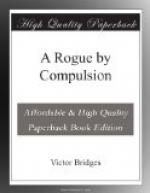The question of a suit of clothes was the only problem that offered any real difficulties. Apart from the fact that Savaroff’s suit was by no means in its first youth, I had a strong objection to wearing his infernal things a moment longer than I could help. I was determined to have a decently cut suit as soon as possible, but I knew that it would be a week at least before any West End tailor would finish the job. In the meantime I wanted something to go on with, and in my extremity I suddenly remembered a place in Wardour Street where four or five years before I had once hired a costume for a Covent Garden ball.
I told the man to drive me there, and much to my relief found the shop still in existence. There was no difficulty about getting what I wanted. The proprietor had a large selection of what he called “West End Misfits,” amongst which were several tweeds and blue serge suits big enough even for my somewhat unreasonable proportions. I chose the two that fitted me best, and then bought a second-hand suit-case to pack them away in.
I had spent about fifteen pounds, which seemed to me as much as a fifty-pound capitalist had any right to squander on necessities. I therefore returned to the taxi and, arranging my parcels on the front seat, instructed the man to drive me down to the address that McMurtrie had given me.
Pimlico was a part of London that I had not patronized extensively in the days of my freedom, and I was rather in the dark about the precise situation of Edith Terrace. The taxi-man, however, seemed to suffer under no such handicap. He drove me straight to Victoria, and then, taking the road to the left of the station, turned off into a neighbourhood of dreary-looking streets and squares, all bearing a dismal aspect of having seen better days.
Edith Terrace was, if anything, slightly more depressing than the rest. It consisted of a double row of gaunt, untidy houses, from which most of the original stucco had long since peeled away. Quiet enough it certainly was, for along its whole length we passed only one man, who was standing under a street lamp, lighting a cigarette. He looked up as we went by, and for just one instant I had a clear view of his face. Except for a scar on the cheek he was curiously like one of the warders at Princetown, and for that reason I suppose this otherwise trifling incident fixed itself in my mind. It is funny on what queer chances one’s fate sometimes hangs.
We pulled up at Number 3 and, mounting some not very recently cleaned steps, I gave a brisk tug at a dilapidated bell-handle. After a minute I heard the sound of shuffling footsteps; then the door opened and a funny-looking little old woman stood blinking and peering at me from the threshold.
“How do you do?” I said cheerfully. “Are you Mrs. Oldbury?”
She gave a kind of spasmodic jerk, that may have been intended for a curtsey.
“Yes, sir,” she said. “I’m Mrs. Oldbury; and you’d be the gentleman I’m expectin’—Dr. McMurtrie’s gentleman?”




